
16 Jun How Canola Oil is Killing You
Did you know that one of the supposedly “heart-healthy” oils is actually disastrous for your heart health? Since the world has become obsessed with lowering cholesterol, canola oil, soybean, corn, sunflower, and other “vegetable” oils have replaced the traditional fats of butter and lard in our diet. We are now so programed to think negatively about animal fats that the even the word “lard” sounds disgusting to most people despite lard being healthier than vegetable oils used in your food or for cooking.
Canola oil is very inflammatory
Canola oil is widely used in salad dressings, many protein
bars, in restaurants for frying, and practically any processed food that you
can buy. Canola is very high in
inflammatory Omega 6 fat content. Also,
the Omega 3 fats found in Canola oil are quickly transformed to trans fats
during processing or in cooking. One of
the major sources of inflammation in the American diet is the shift to a
majority of Omega 6’s. Inflammation is
the main source of heart disease and is what makes cholesterol stick to the
walls of the arteries. Studies have
shown that inflammation (not cholesterol levels) from Omega 6’s increase the
risk of heart disease, atherosclerosis, stroke, and a host of other conditions.[i]
Canola oil causes calcification of arteries
The Omega 6’s contained in Canola oil isn’t the only way that it damages our bodies. Canola oil can damage your arteries and increase calcification of your arteries directly by way of its content of dihydro-vitamin K1. This inhibits the activity of Vitamin K2, which is needed to activate cells in bone to take up calcium into teeth and bones. When vitamin K2 is affected in this way, calcium instead is deposited into arteries and kidneys, damaging them.[ii] It also causes decreases in platelet counts, accelerates cerebral hemorrhages, and decreases testosterone levels.[iii] [iv]
Eating out is a major source of Canola oil
Canola oil was formulated in the 1970’s from rapeseed oil, which was used for lubricating machine and steam engine parts. There was a push to repurpose the oil because of significantly decreased demand after the end of WWII but originally it was considered too toxic for because of its high levels of erucic acid which are damage heart muscle. Erucic acid increases fat deposition in heart muscle, can cause death of heart tissue and scar formation in heart tissue. The newly formulated (and renamed) Canola oil contained less than 2% of erucic acid. Unfortunately, the cardiotoxic effects of erucic acid are still present when a diet high in Canola oil is eaten (which is the case currently in the U.S.)[v] If you are eating out at restaurants, you can bet that you are getting Canola oil in your diet.
Canola oil is toxic for your brain
Recently, Canola oil has been linked to memory problems and
Alzheimer’s Disease.[vi] A diet high in Canola oil has been shown to
increase body weight and inflammation.
Canola oil does not appear to significantly affect levels of amyloid
beta or tau neurofibrillary tangles, but does tend to favor the intracellular
accumulation of insoluble amyloid beta and fibril formations. But a diet high in Canola oil significantly decreases working memory as well
as worsens connections between nerve cells.
When it comes to Canola oil, just say “no”
In summary, Canola oil can be quite damaging to your heart health, your brain health, and your overall disease risk and all attempts should be made to eliminate it from your diet. Often the public is unaware of how much Canola oil they are actually consuming because they are often not reading label ingredients (especially of products labeled as “healthy”) and they underestimate how much oil they are exposed to when eating out. Most processed foods have high levels of vegetable (seed) oils, including Canola and Soybean oils which are significantly contributing to a decrease in health. Although it was not the topic of this particular article, Soybean oil has many of the same negative effects as Canola oil and should be avoided just as judiciously.
Madeleine M Castellanos, MD is a practitioner of functional medicine – working with people to identify the root cause of their symptoms and helping them to reverse the process of illness through diet, nutrition, and lifestyle optimization. She also integrates the physical with the mental and spiritual aspect of health and teaches people how to use these together for their best quality of life. In her private practice, she does body composition analysis, can recommend nutritional and toxic element testing, and hormone evaluation. For more information, or to book an appointment, please call 917-454-8444.
Follow Dr Castellanos on Twitter at @DrCastellanos
Follow Dr Castellanos on Facebook at Madeleine M Castellanos, MD
[i] Patterson E, Wall R, Fitzgerald GF, Ross RP, Stanton C. Health implications of high dietary omega-6 polyunsaturated Fatty acids. J Nutr Metab. 2012;2012:539426. doi:10.1155/2012/539426 (https://www.ncbi.nlm.nih.gov/pmc/articles/PMC3335257/)
[ii] Hashimoto Y, Mori M, Kobayashi S, et al. Canola and hydrogenated soybean oils accelerate ectopic bone formation induced by implantation of bone morphogenetic protein in mice. Toxicol Rep. 2014;1:955–962. Published 2014 Nov 4. doi:10.1016/j.toxrep.2014.10.021 (https://www.ncbi.nlm.nih.gov/pmc/articles/PMC5598561/)
[iii] Huang M, Watanabe S, Kobayashi T, et al. Unusual effects of some vegetable oils on the survival time of stroke-prone spontaneously hypertensive rats. Lipids. 1997;32(7):745-751. Published 1997 Dec 01. (https://aocs.onlinelibrary.wiley.com/doi/abs/10.1007/s11745-997-0095-z)
[iv] Harumi Okuyama, Naoki Ohara, Kenjiro Tatematsu, Shinya Fuma, Tomoyuki Nonogaki, Kazuyo Yamada, Yuko Ichikawa, Daisuke Miyazawa, Yuko Yasui, Seijiro Honma, Testosterone-lowering activity of canola and hydrogenated soybean oil in the stroke-prone spontaneously hypertensive rat, The Journal of Toxicological Sciences, 2010, Volume 35, Issue 5, Pages 743-747, Released October 01, 2010, Online ISSN 1880-3989, Print ISSN 0388-1350, (https://www.jstage.jst.go.jp/article/jts/35/5/35_5_743/_article/-char/en)
[v] Parke D, Parke A. Rapeseed oil: An autoxidative food lipid. Journal of Clinical Biochemistry and Nutrition. 1999;26(2):51-61. (https://www.jstage.jst.go.jp/article/jcbn1986/26/2/26_2_51/_pdf)
[vi] Lauretti E, Praticò D. Effect of canola oil consumption on memory, synapse and neuropathology in the triple transgenic mouse model of Alzheimer’s disease. Sci Rep. 2017;7(1):17134. Published 2017 Dec 7. doi:10.1038/s41598-017-17373-3 (https://www.nature.com/articles/s41598-017-17373-3.pdf)




No Comments